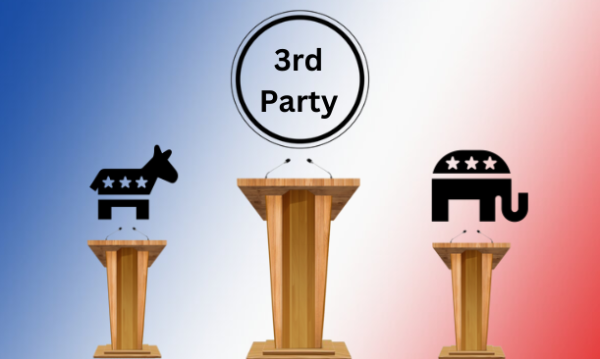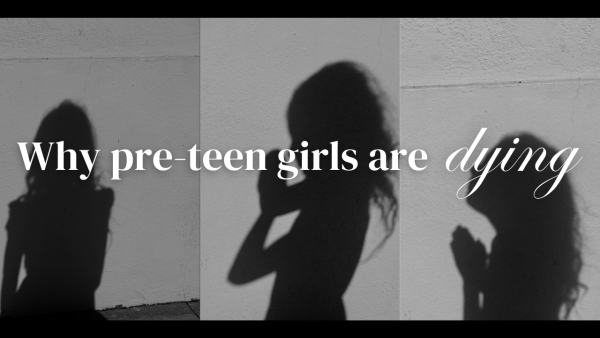Food for political thought
Photo created by senior Alison Kulak
We tend to approach politics as if it was comfort food. We like the eggs of hearing someone else exaggerate their frustration on a certain topic. We crave the hamburger of mocking the side that does not align with ours, and we salivate over the cherry on top of headlines that confirm our points. But we fail to eat vegetables. We need to put aside our instincts to repost something on our social media pages just to share our outrage. We need to build our muscles of learning to understand the people who we don’t naturally connect with. We will always have discomfort with people we don’t agree with, but we must abide by doing so for the better of our country.
Somewhere along the lines in our history, we as Americans decided that we don’t like being uncomfortable. More than 50% of Americans don’t have a will, according to a Caring.com survey, because the thought of us dying makes us uncomfortable. Most of us do not exercise because let’s face it, exercise is uncomfortable on the body.
As Dr. Sherry Pagoto, a professor at the UConn Center for Health & Social Media said, “We live in a society where we keep the indoor temperature adjusted to perfection all year round, wrap ourselves in soft clothing, wear thick-soled shoes to protect our feet from harm, and lay on cushy beds draped with poofy covers. And we must ask ourselves, has all of this first world pampering made us intolerant to even mild physical discomfort?”
For example, topics like abortion are rarely talked about because it is uncomfortable to talk about. The thought of choosing who lives and dies is a very tacky topic. When talking about abortion, there are two–and only two sides. Pro-life, the side that wants life, or pro-choice, the side that wants choice. If you are a Democrat, you do not have a choice; you ARE pro-choice. If you are Republican, especially if you’re a Republican politician, you are pro-life.
Too often we try to avoid emotions. We use food, shopping, and alcohol, or really anything, to put distance between ourselves and the things that cause us discomfort. We avoid thinking about anything that makes us uncomfortable by rushing to find something that entertains us.
Pema Chodron, an American Buddhist and Ordained Nun, illustrated the unwillingness to be uncomfortable by describing her experiences on an airplane. Where everyone has an electronic device or book or a newspaper, she asked herself, “what would it be like to not have any of those things?” Chodron suggested that we would all just try to go to sleep instead of just being there.
Well, the reality of the situation is that “just being” is difficult in a country that feeds on a good storyline for political situations, and especially difficult when the notion of truth and justice always seem to prevail. Our entertainment choices offer a window into how much we value the resolution of discomfort.
The need for a relatively simplistic storyline that always ends in justice has created unrealistic expectations about our political discourse. To avoid the discomfort of situations with no good options, we tend to dramatize the situation; we create stories with heroes and villains.
It’s not that Democrats have come to a different conclusion on what a woman should be able to do with her body, it’s that they want to kill babies. It’s not that Republicans think differently on how social welfare programs should be used, it’s that they hate poor people. And depending on your perspective, you might bloat about school administration wasting dollars or a heartless governor who totally bungled this Coronavirus situation or too many “lazy” people trying to live off the state or even about people who want to set us back into the dark ages by eliminating critical programs. None of these are accurate, they just satisfy our brain’s desires to make something complex and uncomfortable as simple as possible.
Starting in the decade of the 2010s and, I’m afraid, leading into the 2020s and the foreseeable future, Republicans not believing in climate change has become a set law for that party. Yet the Reagan and George H.W. Bush administrations had goals to make the United States the leader of the world when it came to climate change initiatives. You can even argue that the 2008 Republican Presidential nominee, John McCain, ran on a stronger climate change record than his opponent, Barack Obama.
Same thing with taxes.
“It’s crazy, that certain tax loopholes make it so multi-millionaires pay nothing in taxes, but a bus driver has to pay 10% of his salary.”
If you asked some random person from the street who isn’t exactly educated on the topic of politics, they might put all of their life’s savings on a Democrat saying that last quote. But in reality, it was Republican President Ronald Reagan. Shocker– to some.
These ideas have been brought up by organizations and individuals that benefit from encouraging conflict. What was once advertised as a matter of science and logic has turned into an emotionally charged contested subject. It seems like it has become necessary to vilify our opponent; Democrats believe Republicans are stupid, careless, and greedy, and Republicans believe that Democrats are alarmist, gullible, and manipulative– another instance of how our political climate today feeds off of a superhero storyline where there is a “good guy vs. bad guy” dynamic.
The truth is that there is no formula to solve this abortion issue or even climate change– we can’t offer a formula for knowing when specific language or actions will hurt people, nor is there a formula for knowing how to have political conversations without making you uncomfortable.
Yes, there are differences in America, but those differences are for the better. Our system needs people who embrace federal policy to solve problems and, a party. We need people who will strive in the private sector and people who advocate for more public works. The US Constitution is premised on balance. We need everyone. We do not need things to be simple, or people to get right to the point. What we need is for more people to be comfortable with being uncomfortable.












